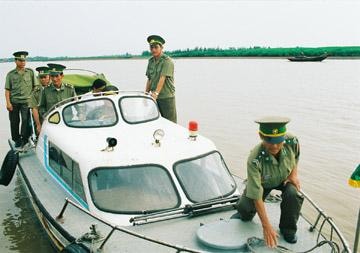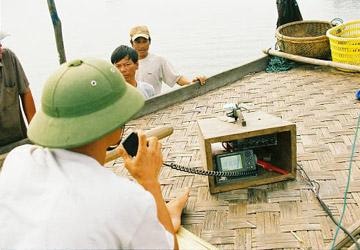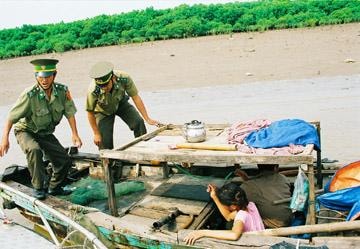Following the footsteps of the green-uniformed soldier
(Baonghean) -Just one trip with the green-uniformed soldiers in the first days of the Spring of the Year of the Ox gave us a closer look at the soldiers on the border roads. On the sea and river routes, day and night, they are never absent.
|
We set off from Lach Con estuary (Quynh Phuong commune, Quynh Luu district, Nghe An) on a relatively beautiful day. Lieutenant Hoang Quoc Sau, Lach Con border control station (KSBP) of Border Guard Station 144, was driving a patrol canoe and told us, above the rumbling engine noise: “Currently, our station manages nearly 1,000 vehicles, including about 500 offshore fishing vessels (14 vessels licensed to fish in the common sea area are the type of vessels that are given their own codes to fish in both Vietnamese and Chinese fishing grounds). Therefore, our patrol and control work cannot be said to be easy.”
Indeed, on the small patrol boat, we were trying our best, carrying nearly 10 of us, weaving between the ships that were close together, going back and forth, endlessly, going back and forth. Lieutenant Sau suddenly slowed down, and pulled up beside the ship with the registration number NA 4945-TS. After checking all the documents, the ship owner named Tuan, fisherman Quynh Phuong scratched his head and ears: "Sometimes when we are in a hurry, the ship goes straight, we cannot report because we have to try to run fast to avoid killing all the crabs, not to disobey your orders."
Mr. Tuan’s boat specializes in crab “balling” (a type of crab catching in cages), each trip lasts about 7 days, reaching the fishing grounds about 100 nautical miles from shore. On the boat are stacked hundreds of crab cages, looking from afar like a giant cage. The investment in “balls” (cages) and ropes for each boat averages more than 20 million VND.
Mr. Nguyen Bui Huan, owner of the NA 94016 boat, told us that each crab fishing trip lasts about a month, yielding about 600-800 kg of crab, the current price is about 50-70 million VND, after deducting expenses, each boat "friend" gets 2-3 million VND/month. That is not enough income to live on for coastal people, so they think of all kinds of ways to earn more, including using explosives. Lieutenant Sau told us: "You see, managing boats here is very complicated, they are people who need to make a living."
|
Lach Con Border Guard Station is located precariously on a cliff close to the sea, surrounded by houses also precariously located by the sea and densely packed with boats. We had to get on a canoe and wade nearly 100 meters to get there. The station currently has 4 officers and soldiers guarding and controlling the entire bustling estuary area. Lieutenant Nguyen Trung Thanh (who has been here for more than 5 years) said: "The station has many difficulties, but the problem that makes us very worried is that there is no control wharf, boats have to stop in the middle of the stream for fishermen to swim in to present their papers to the Control Station, some people swim in but their papers are all wet, it is difficult for the people and difficult for us".
Previously, fishermen in this area often secretly used explosives and electric shocks to catch fish. Until the Prime Minister's Directive No. 01 and 22 strictly prohibiting the use of electric shocks and explosives in fishing, Nghe An border guards regularly controlled, prevented, and actively promoted, so the use of explosives was greatly reduced.
However, that is not all. The work of the officers and soldiers at the station is very difficult because of the large number of ships coming and going regularly. Each patrol trip in the management area is up to 10 nautical miles, sometimes even at night. Two years ago (March 21, 2007), during a patrol, the station discovered and arrested two subjects from Dong Tam hamlet (Nghi Phuong commune) transporting 25 kg of explosives, and handed them over to the authorities for prosecution.
We boarded Mr. Bui Thai Thuy's boat (Quynh Phuong commune, registration number NA 4340-TS), he was testing the Galaxy 6-band radio system to prepare for the trip to sea. This is a mandatory communication device for all boats in Quynh Phuong waters to ensure smooth communication between boats during operations in fishing grounds, especially for emergency communication when the sea is rough.
Following the patrol, we returned to the Dien Chau sea, an area no less bustling with a large number of fishing boats. Dien Ngoc commune alone has over 300 offshore fishing boats, most of which are still operating at a low level because their income is not enough to cover expenses. Mr. Tran Van Thuan (Dong Thuan hamlet, Dien Ngoc commune, owner of NA 2281 boat) said that each pair of boats (offshore fishing usually requires two boats to go together) earns 1.5 million VND/day to cover fuel, ice, and food. Meanwhile, the cost of Halico walkie-talkies (range 150 nautical miles) alone is nearly 20 million VND/set.
|
80% of fishermen go to sea without full papers and certificates, that information has been "witnessed" by us. Checking the pair of offshore fishing boats numbered V0304-V0305 (Dien Bich commune), this is the type of boat licensed to fish in the common waters of Vietnam-China, each trip is 70-80 nautical miles near the common sea demarcation area. Crew member Tran Van Tuyen (when checked for not having enough papers) replied: "I have only been an apprentice for 1 year, have not bought insurance, the life buoy is in storage (?). I do not know about maritime safety because no one let me learn. I only bring my ID card when going far away". On these 2 boats, each trip has 18 crew members, with such awareness of fishermen, how hard must the Border Guard force work to propagate, mobilize and prevent them?
Lieutenant Ho Van Thinh, Head of Lach Van Border Station, said: "Implementing the State's decision and the direction of the Provincial Border Guard Command, the station regularly checks and controls people and vehicles entering and leaving the creek, patrols the entire route and docks to better manage vehicles in the area. These are our great efforts."
The speedboat BP.06.10.04 suddenly slowed down, turned around and blew its horn to chase a ship that was leaving the estuary. Seeing us bewildered, Mr. Thinh explained: "The ship in front must have violated the law." Fishing boat NA-2467 began to speed up, only stopping when the loudspeaker requested it to stop. The Border Guards quickly jumped up to check. The ship owner Nguyen Van Khai (team 1, Dien Thanh commune) was confused: "To tell you the truth, I left all the papers at home because I was afraid... the storm would wet them (?)." But from a corner on the ship, the Border Guards pulled out 3 mines and detonators. Mr. Khai remained silent. A record of the evidence was made, and the papers were taken home. Station Chief Thinh said that this violation was fined about 5-10 million VND.
|
Our canoe started to go deep into Lach Van, a fishing boat going in the opposite direction signaled something, immediately the canoe changed lanes, going closer to the shore at a higher speed. "What are they signaling to you?". I asked. "Ah! The people are signaling that there is someone using electric shocks ahead of us." Here it is, the canoe pressed close to a small boat, looking very "in a bad situation". The Border Guard soldiers quickly jumped onto the boat and quickly searched through the pile of nets to find a set of electric shock "tools" that had just been hastily hidden.
The boat owner who violated the law was Mr. Pham Van Chat in Van Nam (Dien Van). Both father and son looked very poor, they traveled all morning until noon to catch just a handful of fish and small shrimp. In that case, the patrol team could only temporarily confiscate the 12-volt battery with a warning, promising to return it to the BP 152 station. "The people of Van Nam are very poor, and we feel sorry for them, so we can only warn and educate them so they don't repeat the offense." Lieutenant Ho Van Thinh spoke slowly.
In the first days of the year, the colors of the Spring of the Year of the Ox are still eagerly following the spring outings of talented beauties, splendid on the festival flags and bustling in front of the temple grounds... while the border guards are busy with many tasks to ensure the peace of each ship going out to sea and returning laden with fish and shrimp. In the bustle of the fishing port every afternoon, there are the figures of soldiers in green uniforms.
Article and photos: Tran Hai










